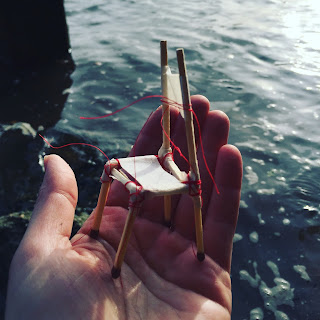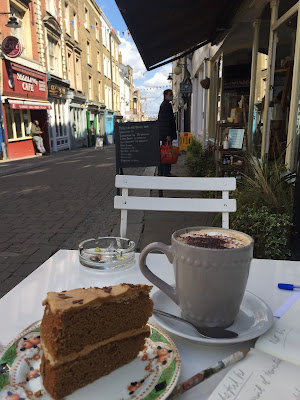Resourcing in the Ruins
Content note: frequent references to death of family, friends and grief
Approx read time: 9 minutes
I’m on the Thames foreshore in Wapping on Sunday 17 January. The UK has had 3,395,959 positive Coronavirus cases, and more than 88,512 people have died. I was unsure whether to keep noting this but it feels as important as the date, to remember and honour those lost. I’ve been struggling with the lack of a national conversation about grief.
By the end of the day, when Sunday’s grim statistics are announced, one of those numbers represents the loss of a vibrant and much loved member of my family.
This is the final of three days of a LADA DIY workshop, all done via Zoom, and led by artist Rachel Gomme. Together, a group of artists have been sharing projects which they lost because of the pandemic. How can we appropriately share the loss of projects, in the context of so much loss of life? The losses we feel are real, like so many others we have lost much that defines who we are and how we are in the world – work, meaning, connection, security.
I struggled before this morning’s Zoom began. We had been invited to create a ritual to mark the loss of a project. For the ritual and been invited to choose a space and some objects significant to the lost project. I felt resentful at having to let go of something, and foolish for feeling so affected.
Mainly because I didn’t want to let the other artists down, or make them feel disrespected by my not taking this seriously, I plunder my flat. I find myself making a tiny chair from extra long matches, masking tape and red thread. I’m letting go of the Pull Up A Chair residency – at least in the way it had originally been planned. And I really don’t want to. I’m not very good at putting myself forward for opportunities. The sort of work that I make, and aspire to make, doesn’t fit easily into residency opportunities. I had been so excited about this residency, and it will now be very, very different from what I’d hoped for. I wonder if I should just step away all together?
I decide that for my ritual, I will burn my matchstick chair on the foreshore* of the Thames - the river that connects me to Gravesham. Am I being overly dramatic or too sentimental? There’s something about burning things on the banks of the river that’s deeply ritualistic. There’s also something about burning making way for the new - the Phoenix myth, the way that some seeds can only germinate after a forest fire. I need to clear out what I thought might happen, and make way for the new.
Before our rituals, the group of artists meet on Zoom. There’s a movement session, and I end up lying on my yoga mat crying. I’m feeling far away from those I love, a thread of tension to a hospital in Birmingham where one of my kin is gravely ill, and the weight of caring for my injured husband. And the pressures of living in lockdown, in a pandemic. ‘All This’, it’s all just a bit much.
As we depart for our rituals, I jump onto my bike and head down to the river at Wapping, with a vague memory of a quiet bit of foreshore down an alleyway.
For the ritual, I’ve brought a clay pot I made in an earlier workshop session, inspired by a lotus and a bumble bee nest. I also have a copy of the Guardian from 17 March 2020, a candle to represent LV21, some bread, rosemary salt, water and my tiny matchstick chair. To light the candle and burn my chair, I have two lighters and the box of long matches. Because I like to be prepared.
As I approach the river, the Thames Path is busy. Walking is the only thing lots of people can do in lockdown. There are leisurely strollers sipping coffee, determined walkers in hiking boots striding forth. Lycra-clad runners plait the streets with cyclists and children on scooters. I enjoy the lack of traffic, the human takeover of the streets.
I zoom down an alleyway to the river, to unexpectedly discover a steep drop onto the riverbank. I can’t get down here – I’ll have to find another place to access the river, where I can get onto the bank. The tide is rising, and soon the all small beaches of the foreshore will disappear.
As I turn to leave, two neighbours appear – we live 300 meters apart and bump into each other over a mile away from home, in this tiny alley. Awkwardly shuffling to find a safe distance from each other, we chat.
I discover that one of them recently lost her grandmother. The family were able to be together at the end, at home with her grandmother after a long, love-filled life. This was a good death, always precious but especially in these times. I chat more with my neighbours, sharing memories of a friend who died recently, and concerns about another friend who is dealing with other bereavements. I shyly explain why I’m there. They point me towards an alley further along with steps down to the river. Eager to beat the rising tide, I thank them and cycle off.
Ancient stone steps, worn into curves by generations of feet, lead down to the river. As I step onto the foreshore, the expansiveness of the river washes over me. I’ve spent so much time inside my flat, it feels a big contrast to suddenly have a wide, shifting view and the smell of mud and salt.
I unpack my bag onto a flat rock and feel a bit awkward, unsure of what to do. A bit of mudlarking turns up a spoon, a bottle and some interesting pebbles. I watch a single ivy leaf, bright green, moving with the brown water. The tide is coming in.
I eat my bread and some of the rosemary salt, scatter more salt on the rock around the candle and my clay pot. As I balance the matchstick chair on the clay pot, I hear voices. Two older women appear at the foot of the stairs behind me, and we surprise each other. I don’t want them to feel they are intruding, so say hello and I hope they don’t mind me. As I struggle to light my candle, we chat. I explain that I’m trying to make a short film of my ritual, that other artists are doing this at the same time, in other places – a moment to mark projects that can’t happen. They are understanding and curious, we talk about loss. One lady says she really feels the loss of planned trip, but in light of everything doesn’t feel like she can talk about it. The river gets higher.
They say goodbye. I return to trying to keep my candle alight, while finding an angle to film the burning of the chair. Then I hear a man’s voice, a suggestion that maybe he can get a pee down by the river. Two men in cycling kit appear, apologise and I laugh, it’s ok. One of the challenges of a lockdown - getting caught short.
They are immediately interested in what I’m doing. I have to light my chair before the water rises and this small beach is gone. I’m struggling with the lighter and one of the men says he can help; ‘I used to be a naughty boy - I can set fires!’ We put our masks on and move a little closer. Taking my lighter, I hold the chair as he lights the legs. The ends are damp from the rock and the rising water, I worry it will not take. Slowly it catches fire and I set it down on the clay pot.
As the chair burns, he tells me about putting conkers in the range cooker in his grandmother’s farmhouse in Lithuania. Once he put more than 50 conkers in, and as they heated up, they exploded all around the kitchen like tiny incendiary bombs. He got in so much trouble.
He’s not satisfied with the my old phone camera or the burn, so builds a new pyre on my clay pot and lights it, filming it with his fancy camera with slow motion. Then WhatsApps the films to me.
His friend, with a London accent, and he laugh and reminisce about drinking honey schnapps in the firestarter’s garden last summer. Their friendship is like a warm, steady light – they are playful, teasing and kind with each other. It’s lovely to be in their presence. The water rises.
With wet feet we retreat up the steps. I wrap the clay pot, with its cargo of ashes, in the newspaper and pack everything away, saying my goodbyes.
I cycle back feeling lighter and energised. All the things that I hoped for from this residency – meaningful connection, creative play and reflection – have just happened. In letting go of this thing which felt so raw and made me feel sad, I was actually able to experience it.
That afternoon I get a phonecall from my mum. While I was on the Thames foreshore, my aunt died. She was actually a first cousin, but in my big, messy family, “aunt” is a title awarded to mark closeness and seniority. A pragmatic, exuberant woman who embraced life and family, and celebrated it all. She hadn’t seen any family, including her husband of 51 years, for more than two weeks. A nurse who had got to know her stayed on at the end of a shift, so someone she knew a little was holding her hand at the end. Our family’s gratitude to that nurse is so deep. I wonder when we’ll next be able, as a family, to gather with music and trifle, to celebrate my aunt’s life.
Making art in the middle of all this feels so insignificant ,and vital at the same time. I think how every drop of water makes the river flow. I’m reminded to trust in the alchemy of generosity and people and play. In our collective resilience.
Pull Up A Chair will happen in March, something will happen. Pride will be the focus, but there will need to be space for loss too.
*the foreshore is the land that appears at low tide but is covered at high tide. I might write some more about the foreshore. It’s a fascinating place.
In loving memory of Carol Price.










Comments
Post a Comment